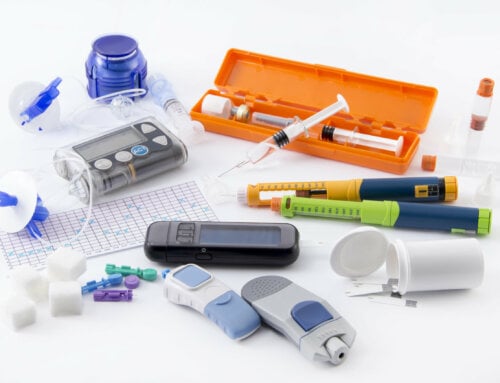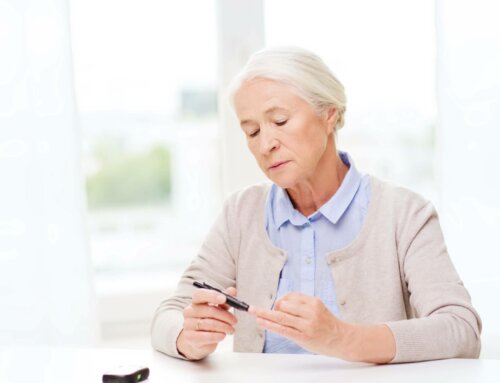May is National Better Hearing Month so I thought it was a good time to share information about diabetes and hearing loss. According to a study published in The Annals of Internal Medicine, “34.5 million people in America have some kind of hearing loss”. Although controversial, according to the ADA (American Diabetes Association), “hearing loss is twice as common in people with diabetes and 14% worse in women with diabetes”. It is also more common in those with pre-diabetes (100-125mg/dl) than those with normal blood sugars. People that do not have diabetes tend to have better hearing than those who have diabetes that is well controlled. 1 in 3 people with diabetes will have hearing trouble because of complications from elevated blood sugars. It has been shown that keeping your A1C at 7% or lower can keep hearing more stable. It has been hypothesized that it is similar to other nerve complications seen in diabetes including retinopathy (eye nerve problems), peripheral neuropathy (nerve ending problems in the feet and hands), and nephropathy (nerve ending damage in the kidneys).
Hearing loss in diabetes is generally due to nerve problems and vascularization in the ears. Hair cells which are specialized in our hearing mechanism are easily affected by the environment including elevated blood sugars. Hearing loss is different from deafness and can sometimes take time for people to realize there is a problem. Do you constantly repeat “excuse me, what did you say” or miss words in crowded noisy spaces? Do you often tell people to stop mumbling? Do you have trouble hearing high pitched voices from women and children? Is your hearing muffled and do you have fullness in your ears? Do you constantly raise the volume on the TV or stereo when your partner says it sounds loud enough? Hearing loss often leads to depression due to increased isolation and retreat from social involvement due to embarrassment. It may lead to anxiety, anger, mood changes and negativism, all which could again lead to high blood sugars. Hearing loss is usually not reversible but there are ways to manage and improve your life with this complication. Below are recommendations and tips on ways to monitor, prevent and cope with hearing loss when you have diabetes:
Tests
When being evaluated for hearing loss, make sure these common tests are included. It should start with a regular physical exam done by your internist or primary care doctor. Sometimes hearing loss can be from a common problem such as ear wax buildup, inflammation or infection. A general exam would include looking for structural problems. Screening tests done by the general physician include covering one ear and testing how well you respond to hearing spoken words at varying volumes. Tuning fork tests are also done by your regular physician. It consists of a metal 2-prong instrument that tests for hearing loss. The instrument is struck and then produces different sounds. The tuning fork test can help determine if hearing loss is in the eardrum, caused by damaged sensors, is a nerve problem or all of the above. Audiologists or hearing specialists are consulted for audiometer tests which are much more thorough. Earphones are placed over your head and sounds are delivered to each ear independently in a range of various tones from loud to faint. Request information when these tests are completed so you can share the results with your entire team.
Treatments
Wax blockage removal is done by softening the wax with oil and either scooping, sucking or draining out the excess wax. This can instantly help hearing. Surgery may need to be performed for chronic inflammation and recurrent infections. Small tubes can be inserted into the ears to help with drainage and reduce infection along with antibiotics and steroids prescribed by your doctor. Hearing aids may be recommended and fitted by an audiologist if hearing loss is associated with inner ear problems. There are multiple styles in very different price ranges which are much more sophisticated than earlier devices. A hearing aid amplifies sound and directs it into your ear. New hearing aids are able to filter out background noise which assists hearing tremendously. It is worthwhile to get rehabillative training after receiving a hearing aid for guidance on the “hows and whats” to expect from your hearing aid. A stapedectomy is a surgical procedure performed by an ENT when the middle ear has a conductive impairment that causes hearing loss. A laser is used for stapes prosthesis which improves hearing when it is healed. Cochlear implants may be used if severe hearing loss is caused by inner ear problems. This procedure is also performed by an ENT. It consists of sophisticated software that gives you access to sounds you are missing by digital information communicating with the brain.
Prevention for Hearing Loss:
- The best prevention for those with diabetes is to control your A1C to 7% or below as this will preserve nerve function. Always take your medication correctly, do not miss doses, walk or exercise daily and eat a low carbohydrate/healthful diet. Attend all your medical appointments.
- Do not smoke.
- Take breaks from high noise experiences such as hunting with rifles, snowmobiling, motor cycling, and power boating, mowing the lawn or using power tools.
- Wear headphones or earplugs to concerts, sporting events, musicals, shows or when being exposed to excess noise.
- “85 decibels is the breaking point.” Do not exceed that level of noise for more than 4-8 hours.
- Prevent or treat ear wax problems early on with professional guidance.
- Avoid working in loud occupations if possible- fire fighters, pilots, flight attendants, construction workers, miners, military, musicians and entertainers are included. If these are your professions, then make sure you have proper equipment to protect your hearing.
- Get regular screenings by an audiologist every 2-3 years when under 50 and yearly when 50 or over.
- Treat colds, allergies and respiratory problems promptly. This will help prevent fluid build up in the sinuses and ears, inflammation and possible infection.
- Cut down on aspirin use because this may cause tinnitus or ringing in the ears. Daily baby aspirin intake is not a problem. Chronic tinnitus is difficult to treat.
- Use hair dryers on low settings or wear ear plugs when used on high settings. There are low noise hair dryers for purchase.
- Watch out for daily use of coffee grinders, garbage disposals, blenders and food processors since all these sounds do add up. Look for models under 85dB although most of these products are 88dB or above.
- When listening to an Ipods or MP3 player with earphones in the ear, the volume should be set below 50% and kept in less than one hour a day. Use noise cancelling ear buds so you do not have to compete with background noise.
- If found in a very loud situation, consider ear plugs which will decrease levels by 15-30dB and place ear muffs snuggly over your entire outer ear to bring the level down another 15-30dB.
- Certain medications may affect your hearing including loop diuretics, anti-inflammatories, antibiotics and some cancer medications. Check with your physician when starting a new medication to see how it may affect your balance or hearing. Drug combinations may also affect balance and hearing.
- Apps which will give you information including dB Volume Meter or deciBel are available.
Ways to Cope With Hearing Loss:
- Discuss all options with your medical team including internist, endocrinologist, and ENT, audiologist and hearing specialist.
- Face the person you are conversing with directly.
- Sit in a booth or along the side of the restaurant away from the kitchen instead of in the middle at an open table.
- Watch people’s lips, facial expressions and hand movements. Watch people’s body language.
- Don’t fake that you are hearing the conversation. You may give an inappropriate response and hurt feelings.
- Turn off background noise such as the radio, TV or stereo when possible.
- Locate a quiet setting to really have a conversation.
- Understand that a natural part of aging is hearing loss.
- Join hearing loss support groups, advocacy groups and hearing institutes.
- Do not keep hearing loss a secret. When those around you know your situation, they will try to make it easier.
- Use ALD’s. Assistance listening devices are now offered at movies, theatre, religious venues, lectures and shows. There is also a device for telephone amplification.
Hearing loss can be frustrating for anyone and an added problem for those with diabetes. Get tested regularly and use these suggestions to help you find ways to preserve your hearing!
Always feel free to email me your questions at [email protected] if you would like to share them with ADW diabetes.
NOTE: Consult your Doctor first to make sure my recommendations fit your special health needs.







Leave A Comment